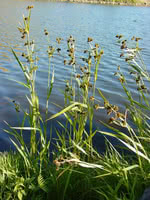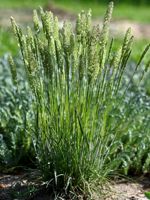Mon-Fri 9am - 5pm Mountain time
Green Bulrush vs Junegrass
Scirpus pallidus
Koeleria macrantha
CUSTOM GROW
NOT AVAILABLE THIS SEASON - MIGHT RETURN
Green Bulrush is a common waterside plant, suitable for erosion control and land reclamation. Despite this, Green Bulrush is very drought resistant once established. Bulrushes can cool nearby areas on hot days.
Unlike many of the other waterside plants available, Green Bulrush does not attract wildlife. This makes it a good choice for surrounding residential water sources.
Green Bulrush is topped with spiky balls of florets, green in the spring and fading to brown in the fall.
Junegrass is a native, low-growing perennial bunchgrass commonly found in prairies and open woodlands. It is a great choice for prairie restoration and naturalization projects or an attractive accent in ornamental plantings. Spear-shaped seed heads rise above the gray-green lower leaves, maturing to a tan color. Flowering earlier than other upright prairie grasses, it greens up quickly in spring and maintains its appeal well into the fall. It is shorter in stature and rarely forms thick stands, which adds to its understated visual appeal.
Adapted to cooler climates, Junegrass thrives in well-drained, rocky, sandy, or gritty soils and can tolerate drought, cold, and high altitudes. It actively grows in spring and fall when soil temperatures are cool, but in areas that are too hot or humid, it may go dormant by late summer.
As a perennial, it dies back to the crown each winter, it will regrow from the base in the spring. Avoid disturbing the crown during late winter to ensure healthy growth the following season.

